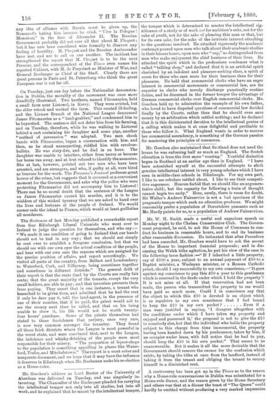Mr. W. H. Smith made a useful and sagacious speech
on Monday night to the Chelsea Conservative Club. The Govern- ment proposed, he said, to ask the House of Commons to con- duct its business in reasonable hours, and to end its business after reasonable discussion. He intimated that after Procedure had been amended, Mr. Goschen would have to ask the assent of the House to important financial proposals ; and in dis- cussing the Welsh tithe agitation, he put his view of the case in the following terse fashion :—" If I inherited a little property, say of £100 a year, subject to an annual payment of 210 to a Baptist minister, a Wesleyan minister, or a Roman Catholic priest, should I say successfully to my own conscience,—' It goes against my conscience to pay this 210 a year to this gentleman which is reserved in the deeds under which I hold the property'? It is not mine at all. If that reservation had not been made, the person who transmitted the property to me would have paid so much more. Could I in conscience say that the object to which this 210 is devoted is an object which is so repulsive to my own conscience that I feel bound
to keep the LIO in my own pocket ? Even if a man were justified in saying, I disagree altogether with the conditions under which I have taken my property and enjoyed and possessed it,' the proposal is not to give the £10 to somebody else, but that the individual who holds the property subject to this charge from time immemorial, the property having been handed down by his predecessor, taken by him, if an occupier under lease, with full notice that he had to pay, should keep the £10 in his own pocket." That seems to us unanswerable. But it makes it all the more desirable that the Government should remove the excuse for the confusion which exists, by taking the tithe at once from the landlord, instead of taking it from the tenant and obliging the tenant to recoup himself in a diminished rent.


































 Previous page
Previous page